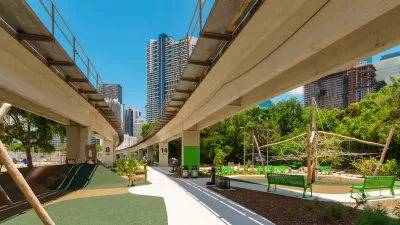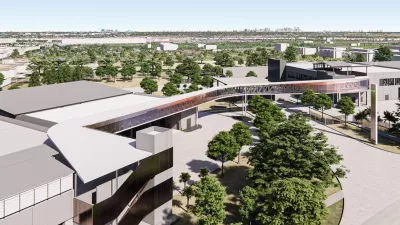As Miami considers using taxes to fund yet another stadium project, analysis indicates the hundreds of millions in public subsidies used for the construction of the city's new baseball stadium will end up costing taxpayers more than $2 billion.
In order to fund a new $639 million ballpark and parking complex for the Miami Marlins, team owner Jeffrey Loria was able to pursuade Miami-Dade County to kick in 70 percent of the cost. Sounds like a sweet deal, right? For Loria, absolutely, but for taxpayers its looking increasingly bad, reports Douglas Hanks.
Because, as Barry Petchesky at Deadspin points out, construction on the stadium needed to start and be paid for immediately, the county was forced to sell bonds on Wall Street at terrible terms. How terrible you ask? As Mayor Carlos Gimenez mentioned recently, just one set of stadium bonds worth about $90 million will cost close to $1.2 billion to pay back by 2048.
"The high interest comes from the penalty Miami-Dade must pay in exchange for a repayment plan that lets the county delay by 15 years making it [sic] first debt-service payment to the Wall Street lenders who bought the bonds," says Hanks. "Because Miami-Dade couldn’t afford a straight-line paydown of the loan — like a home mortgage — the finance team had to be more creative in borrowing the money on Wall Street. Unlike most bonds, these can’t be repaid back early either."
"Remember," adds Petchesky, "this $1.2 billion is only on one set of bonds. The total payments for all of the $500 million borrowed by the county will eventually come in at a whopping $2.4 billion. Not only did Jeffrey Loria get taxpayers to buy him a stadium, but they bought him the most expensive stadium ever built."
FULL STORY: How a $91 million loan on the Marlins ballpark will cost Miami-Dade $1.2 billion

Alabama: Trump Terminates Settlements for Black Communities Harmed By Raw Sewage
Trump deemed the landmark civil rights agreement “illegal DEI and environmental justice policy.”

Study: Maui’s Plan to Convert Vacation Rentals to Long-Term Housing Could Cause Nearly $1 Billion Economic Loss
The plan would reduce visitor accommodation by 25% resulting in 1,900 jobs lost.

Planetizen Federal Action Tracker
A weekly monitor of how Trump’s orders and actions are impacting planners and planning in America.

Restoring Northern India’s Himalayan ‘Water Temples’
Thousands of centuries-old buildings protect the region’s natural springs and serve as community wells and gathering places.

Milwaukee to Double Bike Share Stations
Bublr Bikes, one of the nation’s most successful, will add 500 new e-bikes to its system.

DC Extends Application Window for Outdoor Dining Permits
District restaurants will have until the end of November to apply, but businesses with permits in rush hour parking lanes must end operations on July 31.
Urban Design for Planners 1: Software Tools
This six-course series explores essential urban design concepts using open source software and equips planners with the tools they need to participate fully in the urban design process.
Planning for Universal Design
Learn the tools for implementing Universal Design in planning regulations.
Caltrans
Smith Gee Studio
Institute for Housing and Urban Development Studies (IHS)
City of Grandview
Harvard GSD Executive Education
Toledo-Lucas County Plan Commissions
Salt Lake City
NYU Wagner Graduate School of Public Service





























